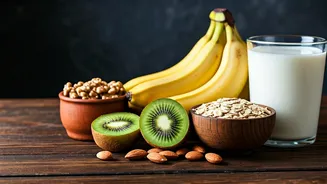Kiwi: Tiny Sleep Powerhouse
Kiwi, a small fruit with a big impact, is believed by some to be a sleep aid. Studies suggest that eating kiwi before bed may improve both sleep onset
(how quickly you fall asleep) and sleep duration. It's thought that the antioxidants and serotonin in kiwis might contribute to these sleep-promoting effects. The fruit is also a source of magnesium and folate, both of which are linked to sleep. Incorporating a couple of kiwis into your evening routine could be a simple and tasty way to potentially enhance your sleep.
Warm Milk: Classic Remedy
The tradition of drinking warm milk before bed is a practice many have sworn by for years, and for good reason. Milk contains tryptophan, an amino acid that the body uses to produce melatonin and serotonin, two hormones crucial for sleep and relaxation. The warmth of the milk itself can also be comforting and soothing, contributing to a sense of calm that helps prepare the body for rest. While the evidence is largely anecdotal, this simple ritual remains a favorite of many people.
Almonds: Nutty Sleep Aids
Almonds are packed with nutrients, and they may also assist in sleep. These nuts are a good source of magnesium, which is known to help improve sleep quality. Magnesium helps reduce the stress hormone cortisol, which can help induce relaxation. Almonds also provide some tryptophan, further aiding sleep. A handful of almonds before bed may be a helpful addition to your nightly routine. Just ensure that the almonds are raw and unsalted for the best outcome.
Fatty Fish: Omega-3 Power
Fatty fish, such as salmon, tuna, and mackerel, are abundant in omega-3 fatty acids and vitamin D. Research indicates that a combination of omega-3s and vitamin D may boost the production of serotonin, further promoting sleep. These are also linked to improved sleep quality and duration. Including fatty fish in your diet may prove to be a worthwhile endeavor. Prepare these dishes with ingredients that support sleep, such as leafy greens.
Chamomile Tea: Soothing Brew
Chamomile tea has long been used as a sleep aid. Chamomile contains apigenin, an antioxidant that binds to certain brain receptors that may decrease anxiety and initiate sleepiness. The calming nature of this tea is well-known, and the act of sipping a warm cup can be a relaxing bedtime ritual. Drinking a cup of chamomile tea about an hour before bed could prove to be a helpful step toward a more restful sleep.
Walnuts: Melatonin Boosters
Walnuts naturally contain melatonin, which helps regulate the sleep-wake cycle. Consuming walnuts might increase melatonin levels in the body, promoting better sleep. They are also packed with essential nutrients and healthy fats. The combination of nutrients and melatonin makes walnuts a valuable food to consider for sleep improvement. Try adding a small portion of walnuts to your evening snack or meal.
Tart Cherry Juice: Natural Melatonin
Tart cherry juice is another natural source of melatonin. Studies have shown that consuming tart cherry juice before bed can improve sleep time and overall sleep quality. The natural melatonin content in the juice helps regulate the sleep-wake cycle, and the antioxidants in it offer additional health benefits. Drinking a glass of tart cherry juice, about an hour or two before bedtime, could become a key part of your wind-down routine, facilitating a more restful night's sleep.



















